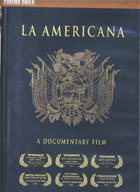
La Americana 2009
Distributed by Cinema Guild, 115 West 30th Street, Suite 800, New York, NY 10001; 212-685-6242
Produced by Nicholas Bruckman and Jesse Thomas
Directed by Nicholas Bruckman and John Mattiuzzi
DVD, color, 65 min.
Jr. High - Adult
Immigration
Date Entered: 01/25/2010
Reviewed by Christopher Lewis, American University Library, American UniversityLa Americana draws a bead on the brutal effect U.S. immigration policy has on families by presenting the tragic story of single mother Carmen and her disabled daughter Carla.
At the beginning of the film Carmen is one of an estimated 11 million illegal immigrants living in the United States. She came to the U.S. from Cochabomba, Bolivia not too chase the American Dream but to make enough money to provide adequate care for her daughter Carla. When Carla was nine-years-old she was hit by a bus and has been in a wheelchair since. Wages available to Carmen in Bolivia weren’t enough to pay medical bills and raise her daughter and she felt her only option was to come to the U.S. illegally to earn the needed money needed. She vowed to return before her daughter’s 15th birthday.
Carmen’s trek to the U.S. via Tijuana is re-enacted. She is then seen working as a house cleaner/dogwalker in New York City. Most of the narrative is told in Carmen’s often tearful words. The anguish she feels about the forced long-term separation is palpable. Her situation is pointedly juxtaposed against the American values embodied by the Statue of Liberty and the mythology of the “American Dream”.
In addition to fears of discovery and victimization inherent in living on the lam, the penalty for illegal immigrants leaving the U.S. and attempting to return again is so great (ten years expulsion) that many see little choice but to accept being permanently separated from their families. However Carmen, true to her word, returns home with what money she’d been able to save. After a joyful reunion with her daughter and family, Carmen discovers that Carla’s condition has declined considerably. A doctor’s recommendation for weekly therapy costs more than she is able to earn. As her savings disappear, Carmen is again faced with the inevitable decision of how to best support Carla. The film closes with her slipping out of her home early one morning and heading to a bus stop. The viewer is left to ponder whether she’s beginning another trek north.
Illegal immigration is a political bombshell and the stories of mothers and fathers struggling to help their families survive dire poverty are always overshadowed by stories of gangs, crime, and burdens on the U.S. taxpayer. This video is a needed document for the debate. Opening with a quote from JFK about the need for a generous and humane immigration policy, La Americana is clearly an advocacy documentary intended to draw attention to current U.S. policy. It’s effective because it vividly captures the tragedy of the lives of Carmen and Carla and appeals to one’s sense of humanity. One would be hard-pressed to find a more sympathetic case than this one.
Production quality is high. The storytelling is cohesive and the filmmaker has created a compelling and intimate portrait of a heart-wrenching case. The film has won several film festival awards and is being used by several groups to aid in the fight for immigration policy reform. Highly recommended for all academic and public libraries with representation of Latin American studies, immigration studies, human rights, international relations, and U.S. domestic policy.